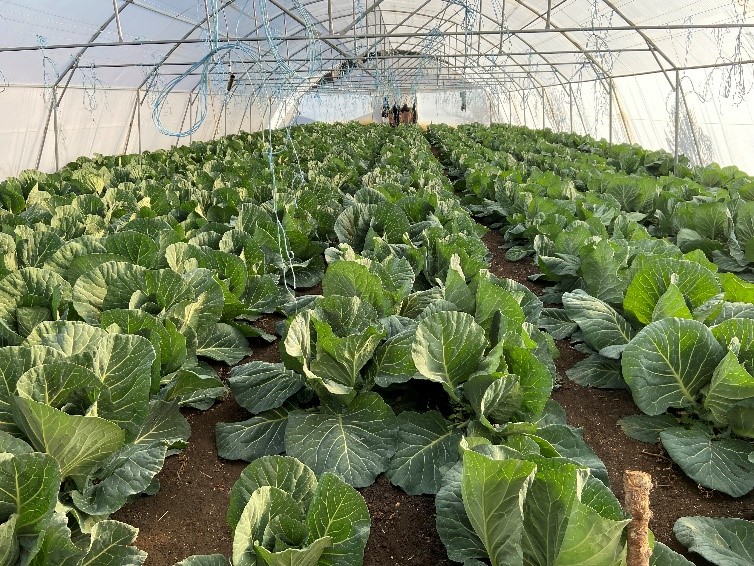
Small-holder farmers produce high-value crops as part of MCC's Market Driven Irrigation Horticulture (MDIH) Project.
In 1973, the AAAS STPF program was launched to inject science and engineering into the national policy arena and to equip scientists and engineers with new skills to conduct and communicate their science to support federal policymaking. In 2004, MCC was established to change the conversation on how best to deliver smart U.S. foreign assistance by focusing on good policies, country ownership, and results. For MCC, the value of the STPF program is to have experts who can bring new approaches, knowledge, and ideas to help us improve our work and ultimately our impact across the globe.
MCC values data-driven decision-making and its commitment to making decisions based on evidence and data pervades all stages of the agency’s engagement with its country partners. Over the past 7 years, MCC has hosted 20 Science and Technology Policy Fellows who have significantly contributed to MCC’s success through improved data analysis and best practices in a wide range of technical areas. These areas include, for example: qualitative methods, political economy analysis, application of geographic information systems, data science, open data, developing project logic tools, and social and behavior change.
These contributions have come from Fellows with a wide range of academic backgrounds, some not traditionally affiliated with the field of international development.
MCC has increasingly helped our country partners to achieve sustainable and lasting socio-economic change. This requires changes in institutions, including the application of Social and Behavior Change principles to support that change.

AAAS Science and Technology Policy Fellow (STPF) Shilpa Constantinides
Shilpa shares her insights about how she applied her expertise and skills to support MCC’s Market-Driven Irrigated Horticulture Project (MDIH) within the Lesotho II Health and Horticulture Compact and MCC’s Social and Behavior Change Team.
Shilpa Constantinides tells us: “As a social scientist with an understanding of the drivers of human behavior, I joined MCC’s SBC team eager to dive deeper into the following questions: 1) When determining funding priorities and program design in international development, how do decision-makers use an understanding of the factors that shape people's environments and motivate their behavior? and 2) How can that science be better presented or framed to guide decision-making centered on the needs of the most vulnerable?
Recognizing that smallholder farmers would be undergoing massive lifestyle and livelihood changes that would require coordinated and consistent support, I led the team through an early exercise to identify each decision that farmers will need to make along the transformational journey from subsistence farmers to commercial irrigated horticulturalists. I also helped the team to map the factors that could support or hinder the ability of smallholder farmers to make that transition. The final step was the alignment of these factors that impact the ability of farmers to make decisions to potential intervention solutions.
This exercise created an opportunity to look at the project from the perspective of smallholder farmers and emphasized the many places along the journey in which collective action and social cohesion would be needed by the participating farmers.
Previous attempts to support irrigated horticulture in Lesotho had failed in part due to a lack of social cohesion and commitment to collective action by participating farmers. To solve this problem, I fostered collaboration between the SBC team and our Irrigation/Agriculture counterparts in Lesotho to study the human factors that contributed to the sustainability or collapse of irrigation schemes in Lesotho. This then led to more research work that used the principles of human-centered design to consider how to work with smallholder farmers to design community associations that would motivate them to participate in collective action.
Currently, I am examining lessons learned by the SBC team from the first round of compacts to use those lessons to improve the alignment of our SBC and Design Thinking services with the needs of the populations we serve.
During my time at MCC, I have learned valuable lessons about how to communicate evidence about human behavior and user experience with those who influence and design policies and programs. I have also participated in the application of a behavior change lens to an entire multidisciplinary project, rather than a standalone behavior change intervention in the context of larger projects.”
As MCC and the AAAS’s STPF program celebrate their respective anniversaries, it provides an opportunity to reflect upon the valuable contributions that AAAS Fellows have made to MCC over the past 7 years. During this time, MCC has hosted social scientists, doctors, chemists, and astronomers. The diversity of ideas, experiences, and academic training of AAAS Fellows has enriched MCC’s work culture, bringing new ideas and opportunities to the agency.

